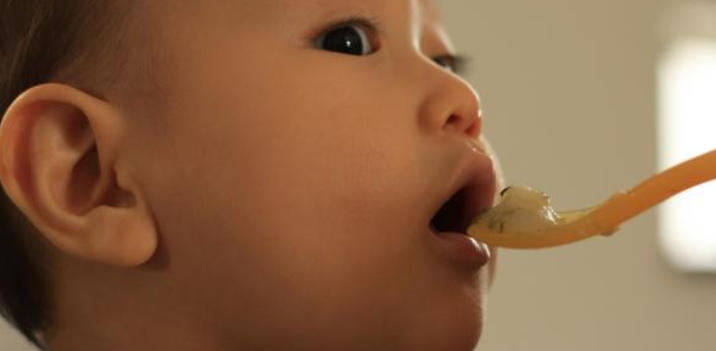In the fourth month, what is baby food?
When it comes to baby food in the fourth month, adequate and appropriate nutrition is necessary and very important in the development of the child and his health throughout his life, since food provides energy and important nutrients for his growth, and breastfeeding is very important for a baby’s growth. Breast milk contains all the minerals and vitamins that a baby needs at that age, and if the mother is unable to breastfeed, you can use powdered milk. It is important to gradually introduce solid food into a child’s diet so that all elements are obtained in sufficient quantities.

Four-month-old baby feeding
Solid food is usually introduced to children between the ages of 4 and 7 months, depending on their nutritional needs and signs of readiness.
Prevent involuntary tongue thrusting in babies, which prevents them from choking and forces food out of their mouths.
Before his mother can give him solid food, the baby must be able to control his neck and head and sit up.
It is a sign that he is ready to eat solid food when he stares at it and tries to grab it.
Turning the child’s face away from the bottle or mother’s breast indicates the child’s ability to determine how much food to eat without overfeeding her.
The weight of the baby should be doubled.
A frequent waking up in the middle of the night.
When a baby is ready to eat solid foods, the mother should select a time when he is not tired and grumpy, so that he is half-starved, and then give him a little milk and sit up straight before starting. As the mother brings the spoon to the child’s mouth, she should smell and taste the food, and if her son refuses the food at first, she should not be surprised, but continue to try even if her whole face is covered in food. When feeding the baby different foods, the order doesn’t really matter, but it’s important to slow down and leave a few days between each type of food, so that the mother can determine which foods the baby is allergic to. It can take months for a baby to learn solid food, so mom does not have to worry about feeding her baby if she refuses certain foods, since she will continue to breastfeed.
Four-month-old baby foods
AAP recommends that moms start feeding their babies solid foods at six months, but some pediatricians recommend starting at four months, depending on the baby’s signs of readiness. The child does not have to eat solid foods at four months of age, and these foods include:
It is not necessary to start with wheat or rice grains, because avocados or bananas are considered the least sensitive grains in children.
After eight months, the mother starts offering raw fruits to her child, and if the fruits are soft like bananas and if the child does not have digestion problems, she can start before then.
Until the child can chew well, vegetables such as sweet potatoes should be cooked and mashed at this age.
It is important for the mother to make sure her child is fed well-cooked meat that has been crushed.
Mothers should not stop breastfeeding their children before the age of one year, whether natural or artificial, because of the risk to the child’s health, and children should not be given low-fat milk. As full-fat milk is necessary at this age, you can go without it.
Start with a small spoonful of crushed food or cereal for babies, and mix it with 4-5 teaspoons of powdered milk to make it liquid, then increase the amount until it is large. Two tablespoons of mashed food or cereal should be given to the mother twice a day by reducing the amount of milk.
Recommendations
The mother should try again in a few days if her child does not accept food the first time.
The mother can easily discover the foods that cause an allergic reaction in her child by recording what her child eats day by day.
The mother should pay attention to the symptoms if one or more members of the child’s family are allergic to certain types of foods, which include; Skin rashes, bloating, increased gas, vomiting, and diarrhea.
The consumption of honey before the age of one year is strictly forbidden, as it contains spores that are not harmful to adults, but can cause food poisoning in children called botulism.
Children under one year of age should not drink cow’s milk as it does not contain the nutrients they need.


